
Serbia–Zimbabwe relations are the bilateral relations between Serbia and Zimbabwe. Yugoslavia was a founding member of the Non-Aligned Movement, of which Zimbabwe is also a part. Neither country has a resident ambassador. Serbia has a non resident ambassador in Pretoria.

The Socialist Federal Republic of Yugoslavia was one of the founding members of the Non-Aligned Movement. Its capital, Belgrade, was the host of the First Summit of the Non-Aligned Movement in early September 1961. The city also hosted the Ninth Summit in September 1989.

Yugoslavia–Zimbabwe relations were historical foreign relations between now split-up Socialist Federal Republic of Yugoslavia and Zimbabwe. Relations between Yugoslavia and Zimbabwe independence movement started before the 1980 independence and were marked by participation of both sides in activities of the Non-Aligned Movement. The formal diplomatic relations between the two countries were established in 1980.

Democratic Republic of the Congo–Yugoslavia relations were historical foreign relations between Congo-Léopoldville or Zaire and now split-up Socialist Federal Republic of Yugoslavia. Formal diplomatic relations between the two countries were established in 1961, and the two maintained embassies in each other's capitals.
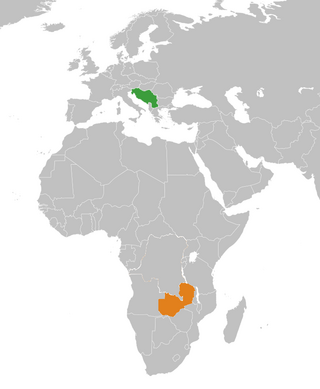
Yugoslavia–Zambia relations were historical foreign relations between now split-up Socialist Federal Republic of Yugoslavia and Zambia. Relations developed and were focused around shared membership and participation in the Non-Aligned Movement activities. Diplomatic relations between Yugoslavia and Zambia were established on 24 October 1964. They reached their peak before and during the 1970 3rd conference of Heads of State or Government of the Non-Aligned Countries in Lusaka when Yugoslavia provided major logistical and diplomatic support to the relatively recently decolonized Zambia.
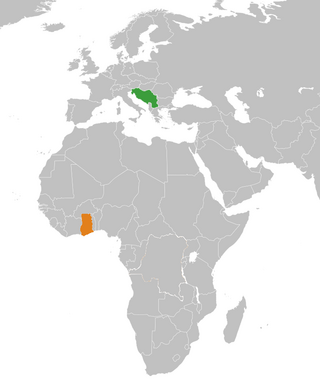
Ghana–Yugoslavia relations were historical foreign relations between Ghana and the Socialist Federal Republic of Yugoslavia. Formal diplomatic relations at the level of Embassy were established in 1959. Both countries were the founding member states of the Non-Aligned Movement at the 1961 Non-Aligned Conference in Belgrade. President of Yugoslavia Josip Broz Tito paid his first State visit to Ghana in 1961, just one year after the full independence of the Dominion of Ghana.
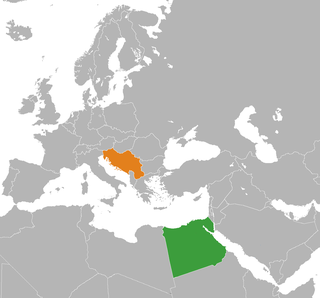
Egypt–Yugoslavia relations were historical foreign relations between Egypt and now break-up Yugoslavia. Both countries were founding members and prominent participants of the Non-Aligned Movement. While initially marginal, relations between the two Mediterranean countries developed significantly in the aftermath of the Soviet-Yugoslav split of 1948 and the Egyptian revolution of 1952. Belgrade hosted the Non-Aligned movement's first conference for which preparatory meeting took place in Cairo, while Cairo hosted the second conference. While critical of certain aspects of the Camp David Accords Yugoslavia remained major advocate for Egyptian realist approach within the movement, and strongly opposed harsh criticism of Cairo or proposals which questioned country's place within the movement.

Uganda–Yugoslavia relations were historical foreign relations between Uganda and now split-up Socialist Federal Republic of Yugoslavia. Formal diplomatic relations between the two countries were established in 1963. Both countries were members of the Non-Aligned Movement and they developed their relations in the framework of the Cold War Third World cooperation. First official state visit between Uganda and Yugoslavia took place in 1965 when the Prime Minister of Uganda Milton Obote visited Yugoslavia. President of Yugoslavia Josip Broz Tito reciprocated the state visit by visiting Uganda on 20 February 1970. President of Uganda Idi Amin visited Yugoslavia between 20–22 April 1976.

Ethiopia–Yugoslavia relations were historical foreign relations between Ethiopia and now split-up Socialist Federal Republic of Yugoslavia. Both countries were among founding members of the Non-Aligned Movement. The first contacts between the two countries were established at the United Nations in 1947 where Yugoslavia supported Ethiopian claims on Eritrea while Ethiopia supported Yugoslav claims over the Free Territory of Trieste. After the 1948, Tito-Stalin split Yugoslavia turned towards the non-bloc countries and two countries opened their embassies in 1955. The formal diplomatic relations were established already in 1952. Emperor Haile Selassie was the first African head of state in official visit to Yugoslavia in 1954.
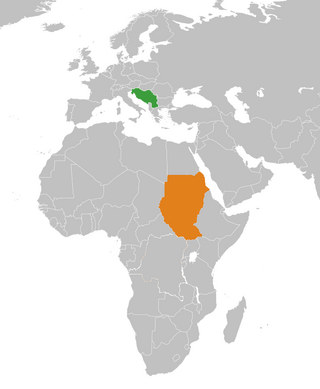
Sudan–Yugoslavia relations were historical foreign relations between Sudan and now split-up Socialist Federal Republic of Yugoslavia. Both countries were founding members of the Non-aligned Movement. President of Sudan Ibrahim Abboud personally participated in the 1961 Non-Aligned Conference in Belgrade. Relations between the two countries intensified after the failed 1971 Sudanese coup d'état when Sudan looked to replace its former ties with the Soviet Union with improved relations with Yugoslavia and the Socialist Republic of Romania.

Morocco–Yugoslavia relations were historical foreign relations between Morocco and now split-up Socialist Federal Republic of Yugoslavia. Two countries established formal bilateral relations on 2 March 1957. Both countries were founding members of the Non-Aligned Movement. Moroccan king Hassan II supported Yugoslav bid to host the first conference of the movement in 1961 even over the candidacy of Cairo. The belief was that Yugoslav bid will “increase the possibility of wider Arab participation” irrespective of some internal divisions. Yugoslav diplomacy on its part gave high priority to country's relations with non-bloc Mediterranean countries.
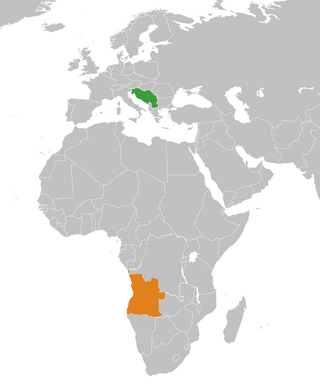
Angola–Yugoslavia relations were historical foreign relations between Angola and now split-up Socialist Federal Republic of Yugoslavia. During the Cold War both countries actively participated in the work of the Non-Aligned Movement.

Libya–Yugoslavia relations were historical foreign relations between Libya and now split-up Socialist Federal Republic of Yugoslavia. Two countries established formal diplomatic relations in 1955.
During the Cold War period former Southeast European country of the Socialist Federal Republic of Yugoslavia established and maintained significant political, cultural and economic exchanges and relations with newly independent African states. While majority of multilateral exchanges were organized via Non-Aligned Movement and the United Nations, significant cooperation developed with the Organisation of African Unity as well, predecessor to contemporary African Union. Yugoslavia was the only non-African country which participated in funding of the Liberation Committee of the Organisation of African Unity. While being a uniquely involved in the workings of the body the country nevertheless preferred bilateral relations with individual liberation movements. The Organisation of African Unity included the Non-Alignment principle in its charter while Yugoslavia consider the organisation to be the only legitimate representative for the entire African continent throughout the Cold War era. Yugoslavia therefore followed common OAU line in its own policies towards issues in Africa.
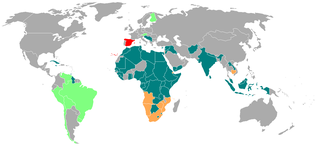
Third Conference of the Non-Aligned Movement on 8–10 September 1970 in Lusaka, Zambia was the third conference of the Non-Aligned Movement. A preparatory meeting of Foreign Ministers drafted a number of resolutions which were considered by the Summit Conference. President of Zambia Kenneth Kaunda opened the conference by underlining non-alignment as "the natural choice at the time of increased hostility created by ideological conflicts in the bipolar world"

The Non-Aligned Movement (NAM) is a forum of 120 countries that are not formally aligned with or against any major power bloc. It was founded with the view to advancing interests of developing countries in the context of Cold War confrontation. After the United Nations, it is the largest grouping of states worldwide.
Second Summit Conference of Heads of State or Government of the Non-Aligned Movement on 5–10 October 1964 in Cairo, United Arab Republic (Egypt) was the second conference of the Non-Aligned Movement which followed the Belgrade Conference of 1961 and preceded the Lusaka Conference of 1970. The city of Cairo was selected as a host of the summit conference at the preparatory meeting held in Colombo, Ceylon, on March 23, 1964. At the beginning of the conference the chairmanship of the Movement was transferred from the President of Yugoslavia Josip Broz Tito to the President of Egypt Gamal Abdel Nasser.

The 9th Summit of the Non-Aligned Movement on 4–7 September 1989 in Belgrade, SR Serbia, SFR Yugoslavia was the conference of Heads of State or Government of the Non-Aligned Movement. Belgrade was the first city to host the Summit for the second time after it hosted the 1st Summit of the Non-Aligned Movement in 1961. Yugoslavia was unanimously selected as the host of the Summit at the 1988 Non-Aligned Foreign Ministers Conference in Nicosia, Cyprus. While the Federal Secretary of Foreign Affairs of Yugoslavia led by Budimir Lončar was excited, the Presidency of Yugoslavia, Yugoslav collective head of state, was skeptical about the prospects of hosting the event but ultimately supported it by Josip Vrhovec in fear that rejection may show the level of the crisis in the country. The comparatively weak federal government organizers of the event ultimately hoped that the conference may convince leaders of the strong Yugoslav federal republics to resolve the early Yugoslav crisis in a constructive and peaceful way, yet it nevertheless escalated in 1991 Yugoslav Wars. The event is therefore sometimes described as the swan song of the prominent Yugoslav Cold War diplomacy. Summit took place at the Sava Centar in New Belgrade. Janez Drnovšek held the opening remarks in Slovenian language.

Nigeria–Yugoslavia relations were historical foreign relations between Nigeria and the former Socialist Federal Republic of Yugoslavia. Formal diplomatic relations between the two countries were established in 1960 after the independence of Nigeria earlier that year. Both countries were members of the Non-Aligned Movement and they developed their relations in the framework of the Cold War Third World cooperation. Yugoslavia was one of the founding members of the movement while Belgrade believed that the reason why Nigeria did not participate in the 1st Summit of the Non-Aligned Movement as one of the founding members was the result of discouragement by the United States as the decision was announced during the prime minister's visit to Washington, D.C. During the existence of socialist Yugoslavia, both countries were organized as multi-ethnic federal states.

Ghana has been a member state of the Non-Aligned Movement since the time of the 1st Summit of the Non-Aligned Movement in 1961 in Belgrade. As the first decolonized country in Sub-Saharan Africa, Ghana actively participated in earliest efforts to initiate Pan-African and Non-Aligned cooperation. Ghana, together with SFR Yugoslavia, India, Indonesia, and Egypt, was one of the five countries that initiated the establishment of the movement.





















